Parents' fears over loss of Batten disease drug
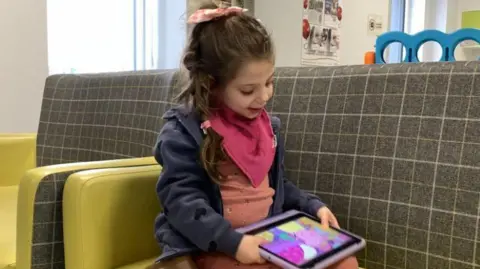 BBC
BBCParents of children with a rare neurodegenerative disease say they are in disbelief they could within months lose access to the only approved treatment that slows the condition's progress.
CLN2 Batten disease is an incurable genetic disorder that causes rapid decline in a child's ability to walk, talk and see.
Phoebe, from Coventry, said daughter Flory's doses of Brineura, or cerliponase alfa, were "keeping her alive".
Managed Access Agreement (MMA) between NHS England and the drug's manufacturer BioMarin is set to expire in May, although "constructive" discussions over permanent access continue between the parties, according to the National Institute for Health and Care Excellence (NICE).
CLN2 Batten disease is estimated to affect about 40 youngsters in the UK, with average life expectancy about 10 years.
Those with the condition appear to develop normally for the first few years of life, but can then deteriorate quickly and experience progressive dementia.
"It's devastating for families to receive that diagnosis," said Liz Brownnutt, chief executive of The Batten Disease Family Association (BDFA).
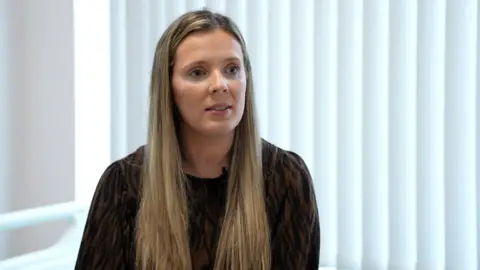
Flory's fortnightly treatment at Birmingham Children's Hospital gave the "incredible, Peppa-Pig-obsessed" six-year-old a "fantastic quality of life", Phoebe said.
"She is still able to walk, she is still able to communicate in her own way. She's still able to eat, and flick pages of a book.
"Her gross motor skills are impeccable. She can pick out a pea from a sweetcorn... she goes to school and she enjoys swimming and going on walks.
"None of this would be possible without Brineura."
Flory was diagnosed two weeks after her third birthday and had immediate brain surgery to install a transfusion device.
Brineura slows the progression of disability by synthetically delivering a missing enzyme responsible for clearing waste from brain tissue.
Phoebe believes that without the medicine, her daughter would be bed-bound.
"She might not even be still here with us, never mind the great energy and life and feistiness that she has," she said, adding she was terrified the treatment could now be taken away.
"If [it is unavailable], are our children going to be left to die?" she asked.
"It's unfathomable this is the situation."
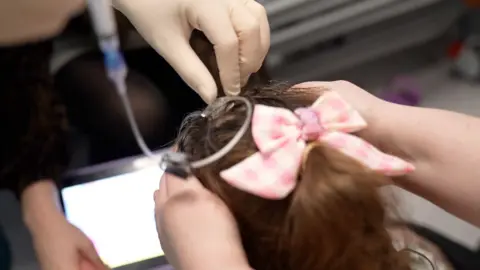
According to NICE, a fortnightly 300mg dose of Brineura costs £522,722 per patient each year.
BDFA described it as a "groundbreaking" treatment that reduced patients' decline by 80%.
Time-limited MMA between NHS England and BioMarin since 2019, with data gathered thereafter to consider whether the treatment could be approved permanently.
The agreement, extended for six months last October, expires on 27 May, with NICE telling the BBC there are currently no arrangements to enable access to Brineura "as part of standard NHS care" after that date.
However, it adds the extension period is being used to try to secure a deal.
"Discussions between NICE, NHS England and BioMarin so far have been constructive, leading to the agreement of the six-month extension, and are continuing," it said.
NHS England confirmed data was being collected to determine whether the drug was "clinically and cost effective".
A BioMarin spokesperson said the drug played an important role as "the only approved treatment" for children with CLN2.
"Our discussions with NICE and NHS England are ongoing, and we remain committed to enabling continued access to Brineura for children in England," they added.
But parents and the BDFA are worried that a price has effectively been placed on life.
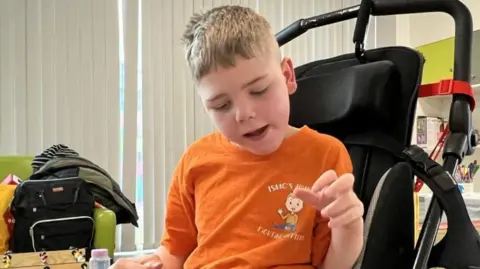
As with Flory, the future of treatment for Isaac, eight, from Kettering in Northamptonshire, is also unclear. He too receives the drug at Birmingham Children's Hospital.
Mum Aimee said: "I just feel under a constant state of stress, because we just don't know what's going to happen."
She said three years of treatment meant her "funny, happy and cheeky" son could still talk, walk aided by a frame and eat pureed food, but she was in "disbelief" his access to it was under question.
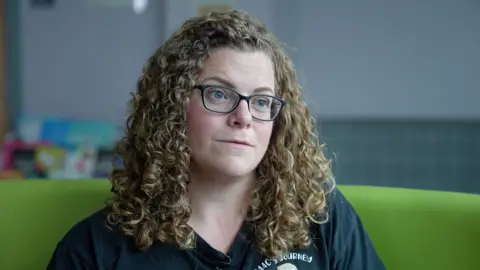
"Our children are not just names and numbers, our children are here," Aimee said.
"They all have a personality, they are human beings.
"There is no cure for CLN2 Batten disease, so this [drug] is what we've got. This is what we need to work with and they need to carry it on for the sake of the children."
The BDFA said families faced "an agonising wait" for clarity.
Ms Brownnutt explained: "There should not be a price on a child's life – these children deserve the right to a good quality of life and more time with their families."
Follow BBC Coventry & Warwickshire on BBC Sounds, Facebook, X and Instagram.
